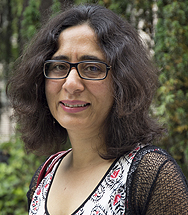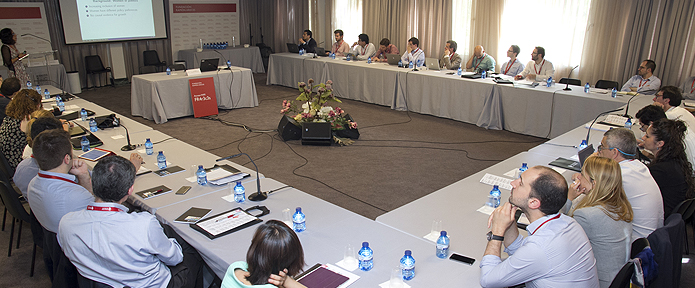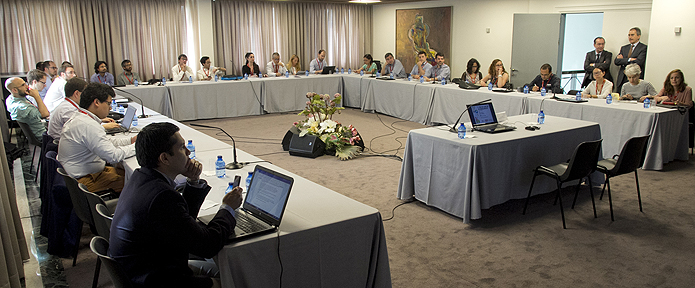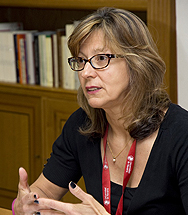"According to programs of study, female presence in governments benefits public health policies, Education and legislation in favor of women."
Sonia Bhalotra, from the University of Essex, gave a lecture discussion paper on women in politics during a meeting organized by the Navarra Center for International Development and the Ramón Areces Foundation.

Sonia Bhalotra, professor of Economics at the University of Essex (UK), participated in the V NCID Research Workshop, organized by the Navarra Center for International Development of the University of Navarra and the Ramón Areces Foundation on June 6 and 7 in Madrid.
She gave a presentation at lecture entitled 'Women in politics, participation and preferences in public policy'. She presented a research that examines whether women's political representation in legislatures improves the public delivery of prenatal and child health services in districts where they are elected.
Sonia Bhalotra is co-investigator and co-director of ESRC -Centrefor Microsocial Change (Institute for Social and Economic Research)- and co-investigator in a project on Human Rights, Big Data and Technology (Human Rights Centre in Law) in Essex, funded by the Economic and Social Research Council.
From agreement with your research, what are the positive effects of women's participation in politics?
In the study Health and the Political Agency of Women, prepared together with Irma Clots-Figueras and published in the American Economic Journal in 2014, we found how an increased female presence in government increased the public supply of health centers and in turn increased the consumption of public services. In addition, we observed a reduction in infant mortality.
programs of study previous reports - cited in our article- indicated that the presence of women in governments has positive effects not only on public health policies - access to drinking water, infant mortality, maternal mortality... - but also on the Education, on the reporting of gender crimes and the introduction of laws in favor of women.
Often, social policies - such as those favoring women and children and those expanding health services - are perceived as being at the expense of the country's economic development .
In our research we showed how districts in India that had elected women after a close election against male candidates saw an improvement in economic performance compared to districts where male candidates were elected.
How can this phenomenon be explained?
Our analysis suggests that, on the one hand, women are generally less corrupt and, on the other hand, more effective in completing infrastructure projects that promote economic growth. We also find that the difference in the growth of a male-led district versus a female-led district is narrower in districts that undergo electoral changes, which can be interpreted to mean that women are less opportunistic.
Why is there this difference between men and women in terms of health policy promotion and Education?
The research in the fields of psychology and Economics sample that women and men have different preferences, whether they are part of the government or not. For example, in general, women are fairer and less likely to take risks. This is consistent with those women in government positions having been shown to be more favorable to developing more progressive or redistributive policies and to be less corrupt, since corruption carries risks.
From agreement with your experience, what are the main challenges in promoting women's political participation in countries at development?
It is important to admit the limitations of female representation in governments, since it is not that they do not win, but that they rarely run for office. In principle, this may be due to their own preferences or their family-related constraints, but it seems more likely that they do not do so largely issue because even if they did, party leaders would not elect them. These may be reluctant to nominate women either because they reflect a bias among voters or because they themselves have a bias.
In article Pathbreakers: Women's Electoral Success and Future Political Participation, co-authored with Irma Clots-Figueras and Lakshmi Iyer, and published as a working paper at Harvard Business School, we empirically examine the effects of model role in Indian politics. Specifically, we study whether the fact that a woman is elected affects greater participation by other women. There is not strong enough evidence to affirm this.
And how can women's political representation in countries be promoted at development?
The greatest potential lies in changes in social attitudes toward women and also among women. There is no way to encourage this in the short term deadline, but history teaches us that it is happening little by little. Women's access to Education and media campaigns highlighting their good performance on position are one way. The creation of quotas for women in government can also help, although research studying this has so far presented ambiguous results.





